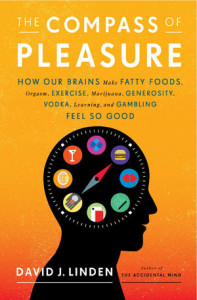Everyday one experiences things that are pleasurable or pleasing to their senses, but why does one have a preference for one thing or person over another? What arouses us to like certain people or things, and how do we develop this understanding of what or who we like and/or are attracted to? After examining different viewpoints and analyzing my experiences, my hypothesis is as follows, that the dopamine levels in our brain that control the feeling of pleasure we get are affected and influenced by our perception of what others will think and how they will perceive what we find pleasurable. In an article written about Paul Bloom, a Psychology and Cognitive Science professor at Yale University, the writer Ted O’Callahan detailed his theories about how we decide what is pleasurable to us and came to the conclusion that “It’s easy to miss the complexity that underlies pleasure”(O’Callahan). According to Bloom’s book, How Pleasure Works, “Pleasure is affected by deeper factors, including what the person thinks about the true essence of what he or she is getting pleasure from”(O’Callahan). After reading over O’Callahan’s article on Bloom’s research, I was prompted to consider how our perception of the world around us and our experiences play a role in how we feel the arousal of pleasure.
Bloom uses the example of Wine experts and how when they are not given all the information, rely on only what they are told to come to the conclusion on whether or not they like or dislike the wine they are tasting. When told they were drinking an expensive bottle of wine they raved over its flavor and richness, the experts “rated” the bottle “as worth drinking”, but when the label was switched to a “lesser quality brand”(O’Callahan) few rated the wine with the same esteem. Our sense of perception of how good a product should be or how attractive someone is, is often affected by our experiences and the opinions of those around us. When brainstorming blog ideas, I received a picture from my best friend in a group chat of 10 girls. It was of a boy that she had recently begun seeing and wanted to know our opinion. That text message prompted me to examine when I had done the same thing or something similar regarding other decisions I had made about my likes and dislikes.This forced me to realize that it is more than possible that some of the things I find pleasing, people I like, or activities I find pleasurable are not unaffected by the bias of those around me.
An article in Time Magazine by Maia Szalavits examines and explains David J. Linden’s understanding of “How our brains make fatty foods, orgasm, exercise, marijuana, generosity, learning, and gambling feel so good”(Szalavitz) in his book The Compass of Pleasure. Linden discusses the correlation between dopamine,pleasure, and addiction; which steers away from Bloom’s sociological and psychological theories on pleasure. Szalavits further explains how “Dopamine actually is what underlies the feeling of pleasure because we also know that if you ask people to report on about how much pleasure they’re getting from eating [or other pleasurable experiences] it matches the [level] of dopamine response”(Szalavitz). Linden’s understanding of pleasure points to how “the role of dopamine” in our brain decides what we find pleasing, which includes “both liking and wanting”(Szalavitz) what we feel we do. He also examines how painful things can be viewed as “pleasurable” in our minds, i.e. “chili peppers-lots of people enjoy then and they are a little painful”(Szalavitz). I believe this is why we get gratification or pleasure from pleasing others. There is a parallel between the pain of eating a chilli pepper and shaping our idea of pleasure based on what someone else prefers. We are giving up what we truly pleasure which can be seen as painful, to experience the enjoyment of making someone else feel good or pleased.
There are numerous factors which affect and determine what we find pleasurable and shape our preferences. After self reflecting on my own life and reading the research of both Bloom and Linden, I believe that what we truly find pleasurable depends upon whether we are thinking about what we like or what we want, and how our experiences and the opinions of others have influenced our preferences and desires. Once we know what we would like or want to happen, then our pleasure is aroused by the coming events which are reflected by the dopamine levels in our brain.
Work Cited:
O’Callahan, Ted. “Why Do We like What We Like?” Yale Insights. 7 Feb. 2013. Web. 10 Sept. 2015. <http://insights.som.yale.edu/insights/why-do-we-what-we>.
Szalavitz, Maia. “Q&A: How Pleasure Works | TIME.com.” Time. Time, 26 Aug. 2011. Web. 18 Sept. 2015. <http://healthland.time.com/2011/08/26/mind-reading-how-pleasure-works/>


This article was really interesting! It is cool that people have different stimulus that cause use pleasure. I like how you incorporated two different sources. I was curious to see exactly what area of the brain control our dopamine levels that cause us pleasure and happiness so I found this article http://www.ncbi.nlm.nih.gov/pmc/articles/PMC3008353/ talking about the anatomy of the concept.